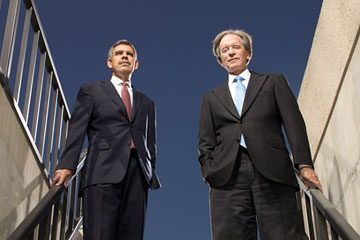
PIMCO's Mohamed El-Erian and Bill Gross.
(2 of 6)
The money wave has been building not just for the past four years but for the past 30. Historically the economy has tended to move in three-year boom-bust cycles. But since the 1980s, central bankers worldwide have begun to use low interest rates and large cash infusions to ease, smooth and stretch those cycles. Politicians, all too happy to provide voters with a cushy ride, have played along. So has the public, taking advantage of the easy-money environment to assume record amounts of debt to buy stocks and houses, hoping their value would keep rising so we could buy more of everything else. That didn't happen. Postcrash, we've only just started to pay down debt, and we have several more years to go, according to analysts like Harvard's Ken Rogoff.
It's a chicken-and-egg cycle: the financial crisis demanded that the Fed pump even more money into the system to avoid a depression. But Washington, which should have then helped remedy the situation with growth-enhancing programs like job retraining, New Deal--style infrastructure building and bigger investments in energy and education, has remained gridlocked. (The PIMCO folks would have liked to see an even larger, sharper stimulus directed toward projects with longer-term job-growth potential.) That added political risk to the model, most recently in the form of the so-called fiscal cliff as the Obama Administration and the GOP face off over deficit and debt reduction.
Washington's inability to do anything, says Gross, has shaped his positively biblical view of the slow-growth future. "It's sort of a seven-years-feast-and-seven-years-famine-type situation," he says. "And we've been feasting for 20 or 30 years." The nonpartisan Congressional Budget Office, which predicts 2.4% yearly growth as far ahead as 2022, seems to agree. Keep in mind that any annual-growth figure of less than 3% limits our national wealth and well-being in the long term.
Navigating Troubled Waters
Given this downer of a forecast, how are we supposed to invest? Keep it real, says the PIMCO pair. "What we try to do is tell clients, Almost anything that we do in the future won't be as high-returning as what you are used to," says Gross. "The double-digit returns, which are the result of both credit expansion and the wave [of globalization and growth] since the 1970s, are in the past. And everything--whether it's a stock or real estate, and certainly bonds--is going to be much lower-returning simply because it's all been brought forward by zero interest rates and the Fed. There's a finite end to that. So how do we navigate in this type of a world? We look for the cleanest dirty shirts."
That's the sort of quip that Gross and El-Erian have become known for. Nearly every investor knows Ben Bernanke's money party can't last, but few sum up this wisdom as succinctly as PIMCO, whose economists and traders are encouraged to simplify complexity by creating pithy taglines for their investment philosophies, many of which get picked up by the financial press. Gross has a coffee mug emblazoned with one of his: DON'T FIGHT THE FED--BUT BE AFRAID.
